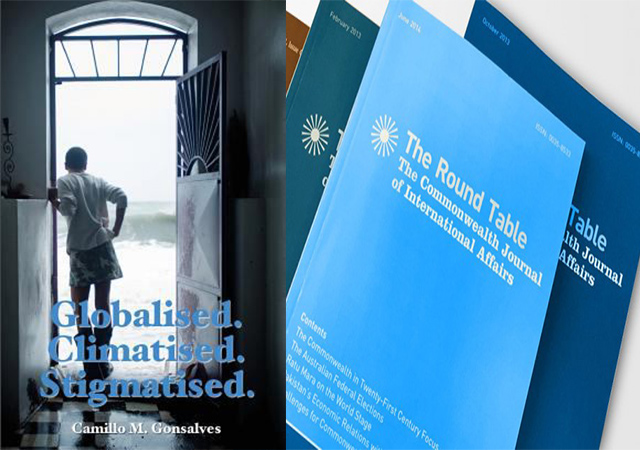
[This is an excerpt from a book review which appears in the latest edition of The Round Table: The Journal of International Commonwealth Affairs.]
The decision by Camillo Gonzales, forty-seven-year-old Minister of Finance, Economic Planning, Sustainable Development, and Information Technology in the Government of St. Vincent and The Grenadines, an independent Caribbean and Commonwealth member-state, to publish a book on the international political-economy of small island states, places the author within the tiny, but visible group of Caribbean political leaders who have married their political activism with their equally urgent responsibilities of thinking and writing. Indeed, the book, Globalised. Climatised. Stigmatised, published by Strategy Forum Inc., was written as part of the campaign by St. Vincent and The Grenadines to become the smallest state ever to occupy a seat as a Non-permanent Member of the Security Council of the United Nations, a campaign which was initiated by the author in his previous role as Permanent Representative of St. Vincent and The Grenadines to the United Nations.
The book makes a marked contribution to an existing academic conversation on the international political economy of small island states in the world system. This conversation began in the 1950s when the first considerations of small state decolonization and sovereignty had thrown up questions around issues of viability and sovereignty. At that time, most of the contributions of Caribbean scholars like Vaughan Lewis and Patrick Emmanuel to the discussion on small states were concerned with making a case for Caribbean sovereignty and independence, to overcome doubts about such countries’ un-readiness and unviability.
In 2019, after four to five decades of concrete experiences of the challenges of independence, the conversation around small states has moved beyond the initial question of size, viability and sovereignty, to more practical questions surrounding the responses to the existential challenges to development and survival. It is in his detailing and describing of these challenges, in his rebutting and rebuffing of the ideas and practices that challenge small state survival, and in his prescribing of what he calls pragmatic responses, that Camillo Gonsalves inserts himself into the conversation on small island development in the twenty-first century.
In the last decade, several papers and books have been written on the separate issues of climate change, financial blacklisting, uneven terms of trade, the politics of aid, IMF structural adjustment, and the impact of neo-liberalism in negating the independence of formerly colonised states. However, Gonsalves’ book is the only one that pulls all of these questions together in one coherent argument and uses the small island developing state as his unit of analysis for building a case for understanding the impact of global developments on small island states as a distinct empirical category in the international political economy.
Gonsalves makes it clear that while much of his discussion is framed around the Caribbean, the book is meant as a discussion on the political economy of all small island states since there are intrinsic political effects and consequences inherent in smallness and in islandnesss. As the author puts it:
- The smallest contributors to climate change are the most affected
- The lowest contributors to terrorist financing or banking impropriety are the most constrained
- The smallest producers of global goods and services are most restricted by the rules of international trade
- The most indebted are among the least likely to get debt relief or concessional financing.
This focus on the impact of the practices of the neo-liberal globalised north on the post-colonial development of small states, locates the book intellectually as part of an emerging OECS School (Organization of Eastern Caribbean States – a sub-grouping of the Caribbean Community – CARICOM), which has been offering a critique of global neo-liberalism and its impact on small states and which has been arguing for the defence of sovereignty and development in the age of globalization. Joseph on the independence experience of St. Lucia can be located in that school, as well as the ongoing work of Grenadian scholar Patsy Lewis, on the economic and political integration of the OECS.
One striking feature of Gonsalves’ intervention is his insistence on avoiding a dismal or defeatist prognosis. Instead, he emphasises and highlights the tremendous development potential of small states. The book calls for a change in thinking about smallness and for a shift in policy around that transformed thinking.
Significantly, there are close similarities between Gonsalves’ approach and that adopted by Patsy Lewis in a forthcoming article in which the latter rejects the notion of the Caribbean as being resource poor and in which she laments the many ways Caribbean policy-makers continue to overlook tremendous opportunities for development. Both Camillo Gonsalves and Patsy Lewis seem to be presenting a post-dependency perspective, which, while fully cognizant of global constraints yet argues for an internal rethinking that can help to overcome lingering colonial psychological legacies of ‘learned helplessness’. The perspective they present is fundamentally optimistic and developmental. Thus, Gonsalves argues:
‘There is no shortage of niche opportunities in the global economy. Increasingly discerning travellers demand tailored niche services focused on yachting, diving, entertainment, cultural, sports, medical, or ecotourism. Opportunities for high-end, well-branded light manufacturing or niche agricultural products abound, as do potential uses for crops with medicinal value from marijuana to moringa. With large exclusive economic zones, island states can seek ways to sustainably exploit maritime resources themselves, rather than cheaply lease their seascape to foreign extractors. Increasingly affluent diaspora communities are potential pre-existing niche markets in major metropolitan centres. Labour can be trained for export as many islands have done with medical professionals, teachers and agricultural workers. Information technology is an underused development accelerant, attractor of foreign direct investment and creator of jobs and knowledge. Islands can also leverage well-educated populations, moderately low wages, proximity to major economies and participation in regional integrated markets to attract and grow medium-sized businesses.’
Tennyson S.D. Joseph is with the University of the West Indies, Kingston, Jamaica.



